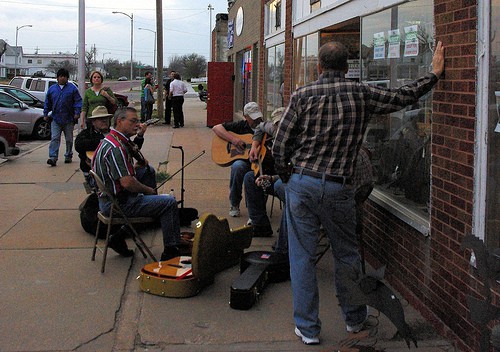
Public spaces belong to us, so how do we want to use them? That’s one part of Placemaking. Photo by Becky McCray.
Placemaking is all about the planning, design and management of the public spaces and assets in your town. When done right, placemaking involves asking the people who actually live and work there, who use the public spaces, what they need, and then actually listening to the answers.
Think of it this way: instead of planning and design of your downtown and town parks being dictated by just a few local leaders or some distant agency, why not get the local people involved in creating what they need? I first heard about placemaking being used in actual practice from Joe Borgstrom of Michigan, where state agencies and local towns are being trained and supported in the idea of making towns into places that better serve their residents. That’s exactly the kind of “everyone working together” action that makes the most sense for placemaking.
That was a super-quick overview, but you can learn more at the Project for Public Spaces, What is placemaking? and Michigan’s Placemaking page.
Now that making your town a better place to live is firmly accepted as the third wave of economic development, we’re approaching a convergence of economic development, community development, and business development. But that doesn’t make it the same as placemaking.
The first purpose of placemaking isn’t about attracting others from outside; it’s about developing the people who live here now and creating opportunities with the assets we have now.
“Placemaking is, ultimately, more about the identification and development of local talent, not the attraction of talent from afar,” Brendan Cain said in Opportunity is Local (Or: You Can’t Buy a New Economy).
There is an economic development benefit to placemaking, but that is because the best solutions always come from within.
“To really grow an economy, opportunity has to be developed organically within each community, and that requires that people dig in and improve their neighborhoods, together, for the sake of doing so–not convincing Google to open a new office down the road,” Cain said.
Work to make your small town a better place, not because it will attract some magical solution from outside, but because you will be improving your own lives and opportunities.
All the focus on attracting people with college degrees or the creative class ignores the higher purpose of every town: using what we have to create better opportunities for the people who are here now.
Cain said this, too:
“Place-making is not about making existing places palatable to a certain class of people. It is a process by which each community can develop place capital by bringing people together to figure out what competitive edge their community might have, and then working to capitalize on that edge and improve local economic prospects in-place, rather than trying to import opportunity from elsewhere.”
Your responses
When I featured this message in the newsletter, you sent me some interesting replies.
Michael Stumpf, Principal at Place Dynamics LLC, sent me a copy of his article on how his dog makes him a better planner. See, his dog connects him to people who otherwise never join the process of community discussion. You can read it in this PDF: A Planners Best Friend. (Shared by permission.)
Jerry Johnson shared about facilitation. A good facilitator can make a big difference in whether a community participation event goes well, or goes off the tracks. Jerry pointed out, people expect you to follow up on the ideas they offer. I often wonder why organizations ask for my input but then never use it. Jerry and I actually got to meet last week in Ponca City, Oklahoma, and talked about his vision for helping small towns. I’m excited for what he has planned!
So what do you think of placemaking? Have you seen examples good or bad? I’d love to hear your thoughts.
And if you’d like to join the lively group sharing our Positive View of Rural, join our email.











[…] owners all for the purpose of enhancing the lives of other locals. As Becky McCray puts it on her blog about […]